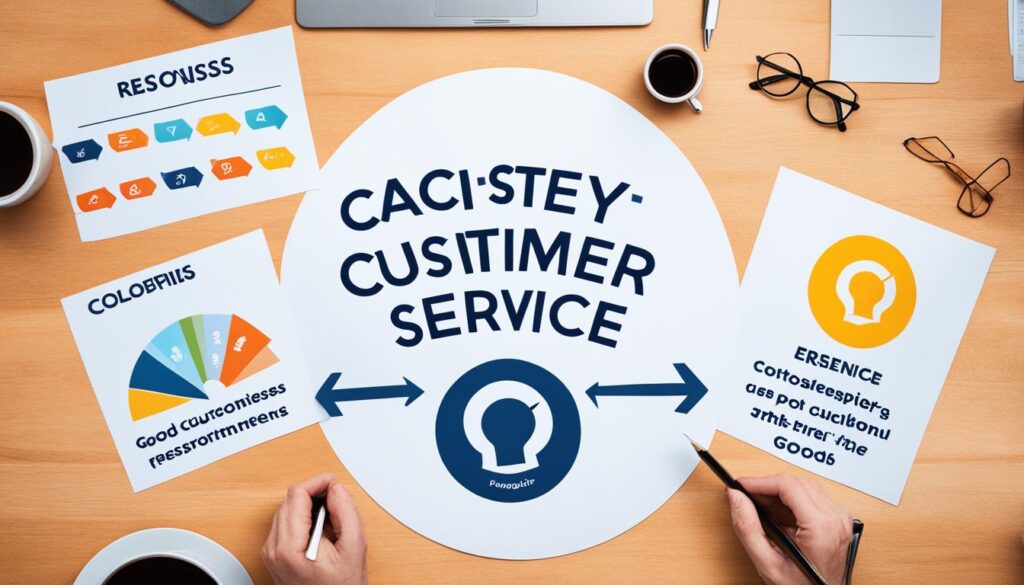Customer service skills are essential for effectively communicating with customers and providing excellent service. They involve a range of abilities such as empathy, problem-solving, communication, active listening, technical knowledge, patience, tenacity, and adaptability. These skills play a crucial role in attracting and retaining customers and can significantly impact a company’s sales and reputation.
Key Takeaways:
- Customer service skills are crucial for providing excellent service and building customer loyalty.
- Key skills include empathy, problem-solving, communication, active listening, technical knowledge, patience, tenacity, and adaptability.
- These skills can impact a company’s sales and reputation.
What is Customer Service?
Customer service is the practice of providing support to customers before, during, and after their purchase. It involves helping customers navigate product or service usage, troubleshooting issues, and ensuring their satisfaction. Good customer service is important because it can improve sales, enhance brand reputation, and lead to customer loyalty. A positive customer experience can also provide valuable feedback for improving products and services.
Customer service plays a vital role in the success of any business. It encompasses the actions and efforts taken by a company to meet the needs and expectations of its customers. By delivering excellent customer service, businesses can build stronger relationships, increase customer satisfaction, and drive customer loyalty.
Importance of Customer Service
The importance of customer service cannot be overstated. Here are some reasons why customer service is crucial:
- Enhanced Customer Experience: By providing exceptional customer service, businesses can create a positive experience for their customers. This can result in increased customer satisfaction, repeat business, and word-of-mouth referrals.
- Increased Sales: Satisfied customers are more likely to make repeat purchases and recommend the business to others. Strong customer service can contribute to higher sales and revenue.
- Brand Reputation: Good customer service helps build a positive brand reputation. Customers are more likely to trust and engage with a brand that prioritizes their needs and provides excellent support.
- Customer Loyalty: When customers receive exceptional service, they are more likely to develop loyalty towards the brand. This can result in long-term relationships, repeat business, and reduced churn.
- Competitive Advantage: In today’s competitive marketplace, businesses need to differentiate themselves. Excellent customer service can be a key differentiator, attracting and retaining customers over competitors.
The key to providing outstanding customer service lies in understanding customer needs, addressing their concerns promptly and effectively, and consistently exceeding their expectations. Brands that prioritize customer service are more likely to succeed and thrive in the long run.
| Benefits of Good Customer Service | Examples |
|---|---|
| Increase customer satisfaction | Zappos offers unlimited free shipping and generous return policy, ensuring customers are happy with their purchases. |
| Build customer loyalty | Apple provides personalized support through its Genius Bar appointments, creating a loyal customer base. |
| Generate positive word-of-mouth | Starbucks replaces spilled drinks quickly and personalizes customer orders, leading to positive recommendations. |
| Drive repeat business | Amazon’s efficient customer service ensures customers keep coming back for their shopping needs. |
| Enhance brand reputation | Nike’s responsive customer service team contributes to its strong brand reputation and customer trust. |
Principles of Good Customer Service
Good customer service is based on several principles that ensure a positive experience for customers. By following these principles, companies can provide exceptional service and build lasting relationships with their customers.
1. Personalized Service
Personalization is key to delivering a memorable customer experience. Tailoring service to meet the unique needs and preferences of each customer shows that you value their individuality. By taking the time to understand their specific requirements, you can provide personalized solutions that exceed their expectations.
2. Competent Service
Competence is crucial in delivering excellent customer service. Employees should have a strong knowledge of the company and its products or services. This allows them to confidently address customer inquiries, provide accurate information, and efficiently solve any problems that may arise.
3. Convenient Service
Convenience plays a significant role in customer satisfaction. Offering support through multiple communication channels, such as phone, email, chat, or social media, allows customers to choose their preferred method of contact. Additionally, making it easy for customers to reach out and providing prompt responses helps streamline the service experience.
4. Proactive Service
Proactive service involves anticipating customer needs and taking initiative to address them before customers even ask. By identifying potential issues or offering relevant information or solutions, you can demonstrate your commitment to going above and beyond for your customers. This proactive approach helps build trust and strengthens the customer-company relationship.
By adhering to these principles, companies can create an environment that fosters personalized, competent, convenient, and proactive customer service. This not only enhances the overall customer experience but also contributes to customer satisfaction, loyalty, and advocacy.

Customer Service Skills for Success
Success in customer service requires a combination of essential skills that enable you to provide exceptional support and create positive experiences for your customers. These skills are vital in building strong relationships, ensuring customer satisfaction, and driving business growth. Let’s explore the top customer service skills that are key to achieving success:
1. Empathy
Empathy is the ability to understand and connect with customers’ emotions and perspectives. It involves putting yourself in their shoes, recognizing their needs, and responding with compassion and understanding. By demonstrating empathy, you can build trust, enhance customer loyalty, and create a memorable experience that sets your brand apart.
2. Problem-Solving Skills
Problem-solving skills are crucial for identifying and resolving customer issues effectively. This skill requires the ability to analyze problems, think critically, and find innovative solutions. By addressing customer concerns promptly and efficiently, you can demonstrate your commitment to providing exceptional service and turning challenging situations into positive outcomes.
3. Effective Communication
Effective communication is essential for clear and concise interaction with customers. It involves actively listening to their needs, articulating information clearly, and adapting your communication style to match their preferences. Good communication skills help build rapport, prevent misunderstandings, and ensure that customers feel heard and valued.
4. Active Listening
Active listening is a fundamental skill in customer service. It means fully understanding customer concerns, asking thoughtful questions, and providing relevant solutions. By actively listening, you demonstrate your commitment to addressing customer needs, fostering trust, and creating a positive experience.
5. Technical Knowledge
Having technical knowledge is crucial for providing accurate information, troubleshooting issues, and guiding customers through product or service usage. It involves staying up-to-date with product features, industry trends, and technological advancements. By demonstrating your expertise, you can instill confidence in customers and ensure that they receive the support they need.
6. Patience
Patience is a valuable skill for handling difficult or frustrated customers. It involves staying calm, composed, and empathetic, even in challenging situations. By remaining patient, you can defuse tension, find effective solutions, and leave a positive impression on customers.
7. Tenacity and Adaptability
Tenacity and adaptability are essential for success in customer service. Tenacity means maintaining a persistent and determined approach to finding solutions for customers. Adaptability involves being flexible and adjusting your strategies to meet customer needs or overcome unforeseen challenges. By embracing tenacity and adaptability, you can provide exceptional support and ensure customer satisfaction.
| Customer Service Skills | Description |
|---|---|
| Empathy | Ability to understand and connect with customers’ emotions and perspectives. |
| Problem-Solving Skills | Crucial for identifying and resolving customer issues effectively. |
| Effective Communication | Essential for clear and concise interaction with customers. |
| Active Listening | Fundamental skill of fully understanding customer concerns. |
| Technical Knowledge | Crucial for providing accurate information and troubleshooting. |
| Patience | Valuable skill for handling difficult or frustrated customers. |
| Tenacity and Adaptability | Essential for persistence and flexibility in finding solutions for customers. |
By continuously developing and honing these top customer service skills, you can elevate your performance, exceed customer expectations, and achieve success in your role.
Brands Known for Customer Service
When it comes to exceptional customer service, there are several well-known brands that stand out. These companies have implemented customer service strategies that prioritize customer satisfaction, helping to build their strong brand reputations. Let’s take a closer look at some of these brands and the outstanding customer service they provide.
Apple
Apple is renowned for its commitment to customer service excellence. With its personalized support portal and Genius Bar appointments, Apple ensures that customers receive individualized attention and tailored solutions. Whether customers need assistance with troubleshooting their devices or have questions about software updates, Apple’s customer service team is there to provide prompt and helpful support.
Zappos
Zappos is synonymous with exceptional customer service. The company goes above and beyond by offering unlimited free shipping and a generous return policy. Zappos understands that customer satisfaction is paramount, and they strive to make every shopping experience pleasant and hassle-free. Their commitment to making customers happy sets them apart in the retail industry.
Starbucks
Starbucks is known not only for its high-quality coffee but also for its outstanding customer service. The company is committed to quickly replacing spilled drinks and ensuring that customers receive exactly what they ordered. Starbucks baristas are trained to personalize customer orders and create a welcoming atmosphere for everyone who walks through their doors. This dedication to providing a positive and personalized experience has helped Starbucks build a loyal customer base.
These brands serve as excellent examples of companies that have truly mastered the art of customer service. By consistently delivering exceptional experiences, they have earned the trust and loyalty of their customers, ultimately solidifying their positions as leaders in their respective industries.

Stay tuned for the next section, where we will explore strategies for improving your customer service skills.
How to Improve Customer Service Skills
Improving customer service skills is essential for providing exceptional support and building strong relationships with your customers. Here are some useful tips to enhance your customer service skills:
- Stay positive: Maintaining a positive attitude can make a significant difference in customer interactions. Positivity creates a welcoming environment and helps diffuse tense situations.
- Practice active listening: Actively listening to your customers demonstrates that you value their concerns and opinions. Give them your full attention and avoid interrupting while they speak.
- Add a personal touch: Addressing customers by their names shows that you care about them as individuals. Personalizing your communication can help foster a sense of trust and connection.
- Build product knowledge: Developing a strong understanding of your products or services allows you to provide accurate information and offer effective solutions to customer inquiries or issues.
- Cultivate empathy: Empathy enables you to put yourself in your customers’ shoes and understand their perspectives and emotions. This understanding helps create a rapport and allows for more effective problem-solving.
- Communicate clearly: Clear communication is crucial in ensuring that information is conveyed accurately and comprehensively. Use simple and concise language to avoid misunderstandings.
- Continuously learn and improve: Embrace a learning mindset and actively seek opportunities for professional development. Stay updated on industry trends and best practices to enhance your customer service skills.

| Tips for Enhancing Customer Service Skills |
|---|
| Stay positive |
| Practice active listening |
| Add a personal touch |
| Build product knowledge |
| Cultivate empathy |
| Communicate clearly |
| Continuously learn and improve |
By implementing these tips, you can improve your customer service skills and provide an outstanding experience to your customers. Remember, customer satisfaction is key to fostering loyalty and driving the success of your business.
How to List Customer Service Skills on a Resume
When it comes to creating an effective resume, highlighting your customer service skills is crucial. Potential employers want to see that you possess the necessary abilities to provide exceptional service to their customers. Here are some tips on how to list your customer service skills on your resume:
- Tailor your skills to the job description: Read the job description carefully and identify the most important customer service skills required. Make sure to include these skills prominently in your resume.
- Highlight relevant skills: Include customer service skills such as problem-solving, communication, empathy, and technical knowledge. These skills are highly valued in the customer service industry.
- Provide specific examples: Rather than simply listing your skills, provide specific examples of how you have utilized these skills in previous roles and achieved positive outcomes.
- Mention certifications and awards: If you have any certifications or awards related to customer service, be sure to include them on your resume. This demonstrates your commitment to excellence in customer service.
By following these tips, you can effectively showcase your customer service skills on your resume and increase your chances of landing a customer service job.

How to Improve Your Customer Service Skills
To improve your customer service skills, there are several key tips you can follow. First and foremost, it’s important to maintain a positive attitude when interacting with customers. A friendly and upbeat demeanor can go a long way in creating a positive customer experience and enhancing satisfaction.
Active listening is another crucial skill to develop. Take the time to truly understand the customer’s needs and concerns, and respond in a way that shows you are fully engaged. This can help build trust and foster effective communication.
Referring to customers by their name is a simple yet powerful way to personalize the interaction. Using their name shows that you value them as an individual and helps create a warm and welcoming atmosphere.
Having in-depth knowledge about your products or services is essential for providing accurate information and resolving customer issues efficiently. Take the time to familiarize yourself with all aspects of what you offer, and be prepared to answer any questions that may arise.
Empathy is another vital skill in customer service. Put yourself in the customer’s shoes and try to understand their perspective. This will enable you to provide more personalized and tailored solutions to their needs.
Clear communication is key to avoiding misunderstandings and ensuring that information is conveyed effectively. Use clear and concise language, and be sure to ask clarifying questions if needed. This will help ensure that both you and the customer are on the same page.
Lastly, never stop seeking opportunities for growth and improvement. Continuously refine your customer service skills and stay up-to-date with industry trends and best practices. Solicit feedback from both customers and colleagues to gain valuable insights and identify areas where you can further enhance your performance.
FAQ
What are customer service skills?
Customer service skills are a range of abilities that enable effective communication with customers and the provision of excellent service. These skills include empathy, problem-solving, communication, active listening, technical knowledge, patience, tenacity, and adaptability.
What is customer service?
Customer service is the practice of providing support to customers before, during, and after their purchase. It involves helping customers navigate product or service usage, troubleshooting issues, and ensuring their satisfaction.
Why is good customer service important?
Good customer service is important because it can improve sales, enhance brand reputation, and lead to customer loyalty. It also provides valuable feedback for improving products and services.
What are the principles of good customer service?
The principles of good customer service include personalized service, competent service, convenient service, and proactive service.
What are the top customer service skills for success?
The top customer service skills for success include empathy, problem-solving, effective communication, active listening, technical knowledge, patience, tenacity, and adaptability.
Which brands are known for exceptional customer service?
Some brands known for exceptional customer service include Apple, Zappos, and Starbucks.
How can I improve my customer service skills?
To improve customer service skills, you can stay positive, practice active listening, refer to customers by name, have in-depth product knowledge, empathize with customers, communicate clearly, and continuously seek opportunities for growth and improvement.
How should I list customer service skills on a resume?
When listing customer service skills on a resume, tailor them to the job description and highlight the most relevant ones. Include problem-solving, communication, empathy, and technical knowledge. Provide specific examples of how these skills have been utilized, and mention any relevant certifications or awards related to customer service.
